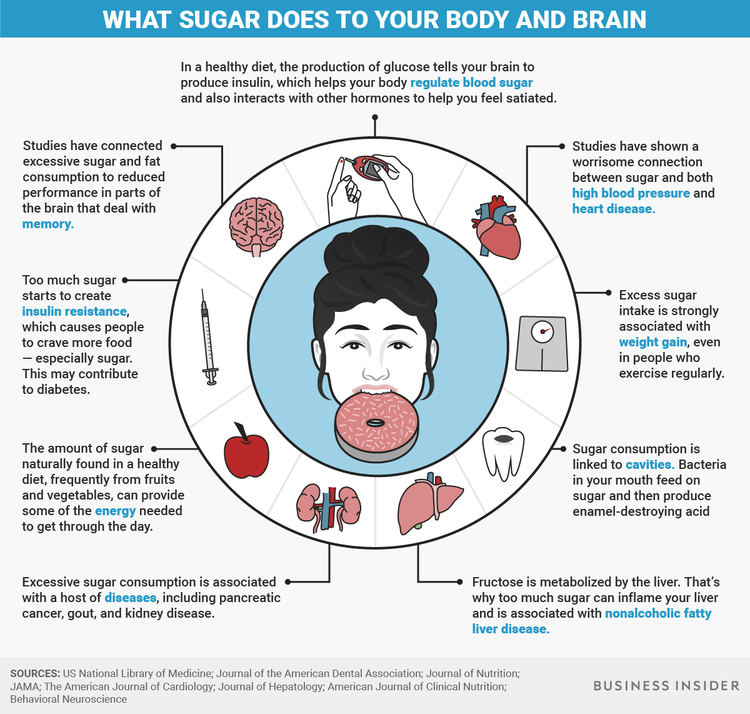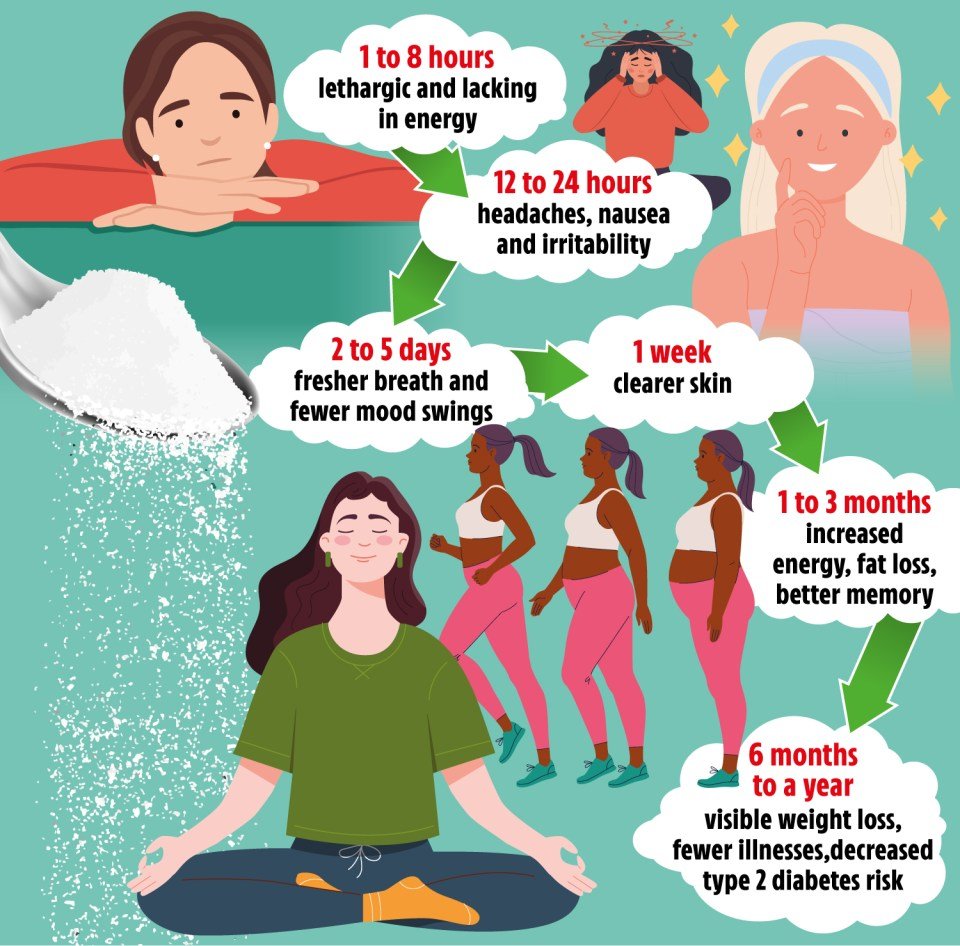Have you ever wondered why losing weight feels so hard, even when you’re careful about what you eat? One sneaky culprit might be sugar.
Sugar doesn’t just add sweetness to your food—it can also slow down your weight loss progress in ways you might not expect. Understanding how sugar affects your body can change the way you approach your diet and help you reach your goals faster.
Keep reading to discover the surprising impact sugar has on your weight loss journey—and what you can do about it.
Sugar And Metabolism
Sugar is a common part of many diets. It can change how your body uses energy.
Understanding sugar’s effect on metabolism helps explain weight loss challenges.
How Sugar Affects Fat Storage
Eating too much sugar can cause your body to store more fat. Sugar turns into fat if not used for energy.
Excess sugar makes the liver produce fat. This fat can build up around organs and under the skin.
- Sugar increases fat creation in the liver
- Extra sugar calories turn into stored fat
- Stored fat can make weight loss harder
Impact On Insulin Levels
Sugar raises blood sugar quickly. This causes the body to release insulin to lower blood sugar.
High insulin levels tell the body to store fat. Insulin also stops fat from breaking down.
- Sugar spikes blood sugar fast
- High blood sugar triggers insulin release
- Insulin promotes fat storage
- Insulin blocks fat burning

Sugar Types And Their Effects
Sugar is found in many foods and drinks. It affects weight loss in different ways.
Understanding sugar types helps you make better choices for your health.
Natural Vs Added Sugars
Natural sugars are found in fruits, vegetables, and milk. They come with vitamins and fiber.
Added sugars are put into foods during processing. They add calories without nutrients.
- Natural sugars come with fiber and nutrients
- Added sugars increase calorie intake
- Added sugars can cause blood sugar spikes
- Natural sugars digest slower and feel filling
Fructose And Weight Gain
Fructose is a type of sugar found in fruit and many sweeteners. It can affect weight differently.
Eating too much fructose from added sugars may increase fat storage. It can also cause hunger.
- Fructose in whole fruit is safer because of fiber
- High fructose intake can raise fat in the liver
- Too much fructose may reduce fat burning
- Limit sugary drinks and sweets with added fructose
Sugar’s Role In Appetite
Sugar can affect how hungry you feel. It changes signals in your body that control appetite.
Understanding sugar’s impact helps explain why it can lead to weight gain.
Cravings And Overeating
Sugar makes you want to eat more. It triggers cravings for sweet and high-calorie foods.
These cravings can cause overeating, which adds extra calories and slows weight loss.
- Sugar boosts dopamine, the brain’s reward chemical
- Dopamine makes you want to eat sugar again
- This cycle leads to repeated cravings and overeating
Sugar And Hunger Hormones
Sugar affects hormones that control hunger. It can disrupt normal signals that tell you when to stop eating.
High sugar intake lowers leptin, the hormone that signals fullness. It also raises ghrelin, the hunger hormone.
- Leptin tells your brain you are full
- Ghrelin signals that you need to eat
- Too much sugar can lower leptin levels
- Sugar can increase ghrelin, making you feel hungry
Hidden Sugars In Foods
Sugar can affect weight loss more than you think. Many foods have hidden sugars that add extra calories.
These sugars are not always easy to spot. They can slow down your progress without you knowing.
Common Sources To Watch
Many everyday foods contain added sugars. These include items that seem healthy but have hidden sweeteners.
- Flavored yogurts and low-fat dairy products
- Breakfast cereals and granola bars
- Salad dressings and sauces
- Packaged breads and baked goods
- Fruit juices and sports drinks
- Canned soups and ready meals
Eating these often can increase your sugar intake. This adds extra calories that can stop weight loss.
Reading Nutrition Labels
Nutrition labels help you find hidden sugars. Look for total sugar and added sugar amounts.
Check the ingredient list for words that mean sugar. These can be hard to recognize.
- Glucose
- Fructose
- Sucrose
- High fructose corn syrup
- Molasses
- Agave nectar
- Brown rice syrup
Choose foods with low or no added sugar. This helps control calorie intake and supports weight loss.
Sugar Alternatives And Weight Loss
Sugar adds calories that can make losing weight harder. Many people try sugar alternatives to cut calories.
Sugar alternatives offer sweet taste with fewer calories. They may help reduce overall sugar intake.
Artificial Sweeteners Pros And Cons
Artificial sweeteners give sweetness without many calories. They can be useful for weight loss plans.
Some people worry about safety and side effects. Artificial sweeteners may affect hunger or gut health in some cases.
- Pros:Low calories, no blood sugar spike, easy to find
- Cons:Possible aftertaste, may affect appetite, some concerns on long-term use
Natural Sweeteners And Impact
Natural sweeteners come from plants and have fewer chemicals. They include options like honey, maple syrup, and stevia.
They add some calories but less than regular sugar. Some natural sweeteners have nutrients or antioxidants.
- Honey: Adds calories but has antioxidants
- Maple syrup: Contains minerals and fewer additives
- Stevia: Very low calories, plant-based sweetener

Strategies To Reduce Sugar Intake
Sugar can slow down weight loss by adding extra calories. Reducing sugar helps you eat healthier and lose weight.
Small changes in your diet can cut sugar without feeling hard. Use simple ways to eat less sugar daily.
Meal Planning Tips
Plan meals to avoid sugary snacks and drinks. Prepare food at home to control sugar amounts.
Include protein and fiber in meals to stay full longer. This helps reduce cravings for sweet foods.
- Choose whole fruits instead of fruit juices
- Cook with natural spices like cinnamon for sweetness
- Use unsweetened yogurt instead of flavored types
- Read labels to find hidden sugars in packaged foods
Mindful Eating Habits
Eat slowly to enjoy your food and notice hunger signals. This can help you avoid eating extra sugar out of habit.
Focus on your meal without distractions. Paying attention helps you choose healthier options and stop at the right time.
- Take small bites and chew well
- Pause between bites to check fullness
- Keep sugary treats out of easy reach
- Drink water before meals to reduce hunger
Scientific Studies On Sugar And Weight
Sugar is a common ingredient in many foods and drinks. Scientists study how sugar affects body weight and fat.
This research helps us understand if sugar causes weight gain or if other factors are involved.
Key Research Findings
Many studies show that eating too much sugar can add extra calories. These extra calories can lead to weight gain.
Some research links sugary drinks to higher chances of obesity. This is because liquid sugar does not make people feel full.
- High sugar intake often means more calorie intake.
- Sugary drinks can increase body fat more than solid foods.
- Reducing sugar helps some people lose weight.
Controversies And Misconceptions
Not all studies agree on sugar’s role in weight gain. Some suggest sugar alone may not cause obesity.
People sometimes think all sugars are bad. Natural sugars in fruits have different effects than added sugars.
- Weight gain depends on overall calorie balance, not just sugar.
- Natural sugars come with fiber and nutrients.
- Added sugars are more likely to cause excess calorie intake.
Frequently Asked Questions
How Does Sugar Affect Weight Loss Efforts?
Sugar increases calorie intake without nutrients. It causes blood sugar spikes, leading to fat storage. Reducing sugar helps control cravings and supports weight loss.
Can Sugar Cause Weight Gain Despite Exercise?
Yes, excess sugar adds hidden calories. It promotes fat accumulation even with regular exercise. Limiting sugar improves fat loss results and overall health.
Is Natural Sugar Better For Weight Loss?
Natural sugars in fruits have fiber and nutrients. They digest slower, causing less blood sugar spikes. Moderation is key, but natural sugars are healthier than added sugars.
How Much Sugar Is Safe During Weight Loss?
Experts recommend limiting added sugar to 25 grams daily. Staying below helps reduce calorie intake and fat storage. Read labels to avoid hidden sugars in foods.
Conclusion
Sugar can complicate weight loss efforts. Cutting back helps manage your weight. Watch your sugar intake closely. Choose natural sources like fruits. They provide nutrients and energy. Processed sugars can lead to weight gain. They often hide in packaged foods.
Read labels carefully to stay informed. Balance your diet with whole foods. Exercise regularly for better results. Remember, moderation is key. Making small changes can lead to big results. Stay committed to your weight loss journey. Understanding sugar’s impact empowers healthier choices.
Keep learning and adapting. Your health is worth the effort.



